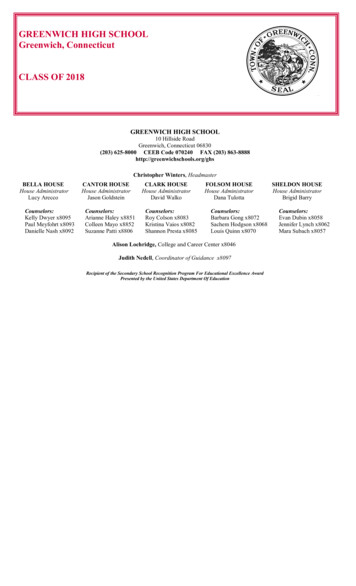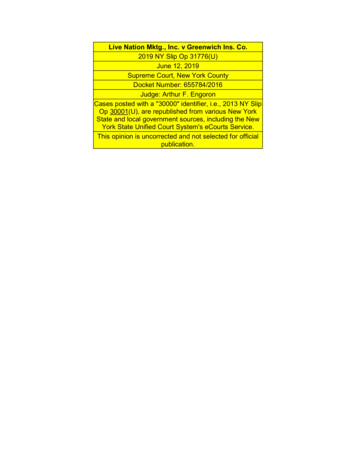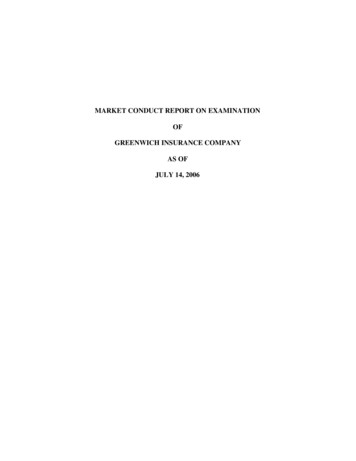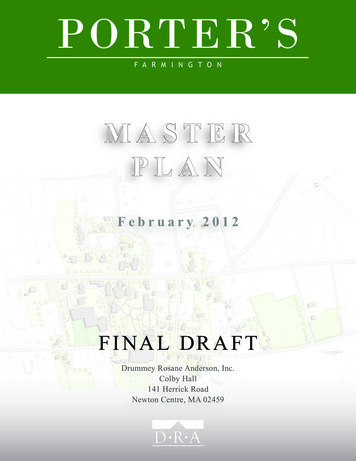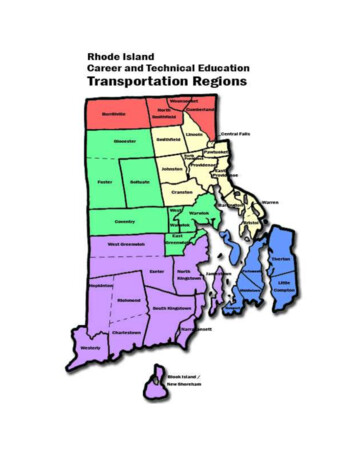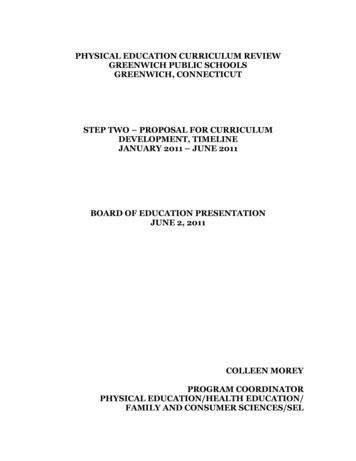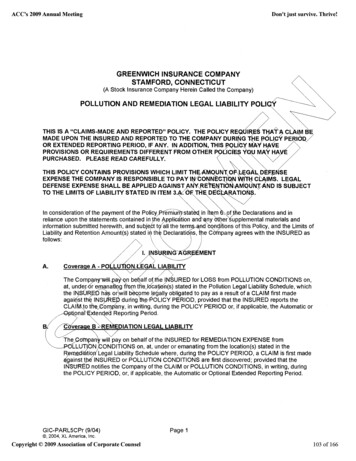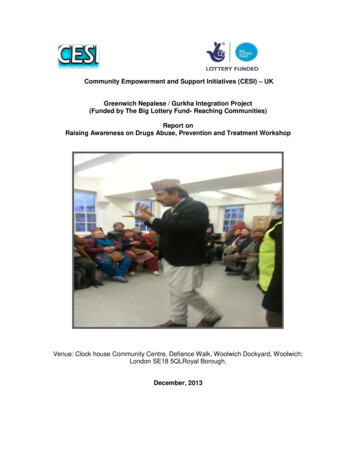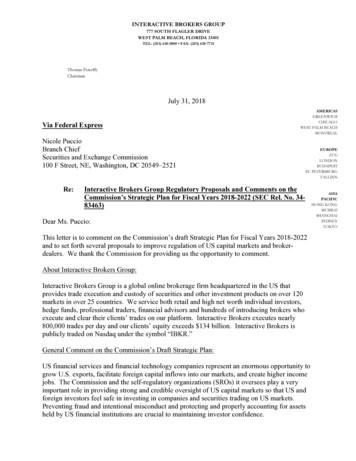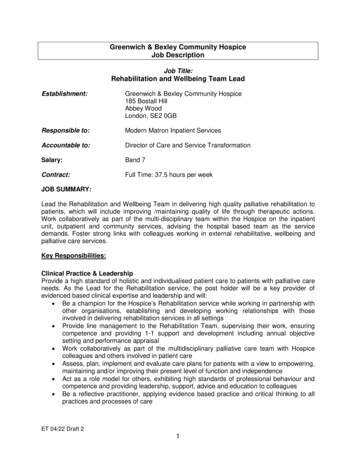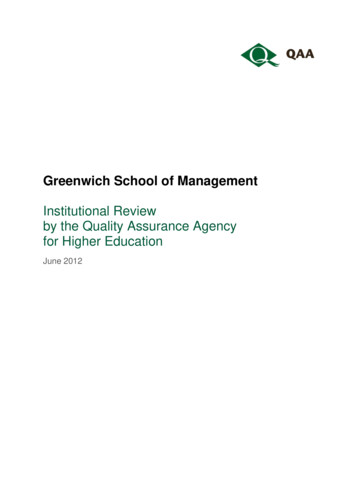
Transcription
Greenwich School of ManagementInstitutional Reviewby the Quality Assurance Agencyfor Higher EducationJune 2012
ContentsAbout this review . 1Key findings . 2QAA's judgements about the Greenwich School of Management . 2Good practice . 2Recommendations . 2Affirmation of action being taken . 3Public information . 3The First Year Student Experience . 3About the Greenwich School of Management . 3Explanation of the findings about the Greenwich School of Management . 512345Academic standards . 5Outcome . 5Meeting external qualifications benchmarks . 5Use of external examiners . 5Assessment and standards . 6Setting and maintaining programme standards . 6Subject benchmarks . 7Quality of learning opportunities . 7Outcome . 7Professional standards for teaching and learning . 7Learning resources. 8Student voice . 8Management information is used to improve quality and standards . 9Admission to the School . 9Complaints and appeals . 10Career advice and guidance . 10Supporting disabled students . 11Supporting international students . 11Supporting postgraduate research students . 11Learning delivered through collaborative arrangements . 12Flexible, distributed and e-learning . 12Work-based and placement learning . 12Student charter . 12Public information . 12Outcome . 12Findings . 13Enhancement of learning opportunities . 13Outcome . 13Findings . 13Theme: First Year Student Experience . 14Supporting students' transition . 14Information for first-year students . 15Assessment and feedback . 15Monitoring retention and progression . 15Glossary . 16
Institutional Review of the Greenwich School of ManagementAbout this reviewThis is a report of an Institutional Review conducted by the Quality Assurance Agency forHigher Education (QAA) at the Greenwich School of Management. The review took place on11-13 June 2012 and was conducted by a team of three reviewers, as follows:Mr Matthew Kitching (student reviewer)Dr Aulay MackenzieDr Mary MeldrumMrs Cathryn Thompson (review secretary).The main purpose of the review was to investigate the higher education provided by theGreenwich School of Management and to make judgements as to whether or not itsacademic standards and quality meet UK expectations. In this report the QAA review team:makes judgements onthreshold academic standards1the quality of learning opportunitiesthe enhancement of learning opportunitiesidentifies features of good practicemakes recommendationsaffirms action that the institution is taking or plans to takeprovides commentaries on public information and the theme topic.A summary of the can be found in the section starting on page 2. Explanations of thefindings are given in numbered paragraphs in the section starting on page 5.In reviewing the Greenwich School of Management the review team has also considered atheme selected for particular focus across higher education in England and Northern Ireland.The theme for the academic year 2011-12 is 'the first year student experience'.The QAA website gives more information about QAA and its mission.2 Backgroundinformation about the Greenwich School of Management is given on page 3 of this report.A dedicated page of the website explains the method for of higher education institutions inEngland and Northern Ireland3 and has links to the review handbook and other informativedocuments.1For an explanation of terms see the Glossary at the end of this spx21
Institutional Review of the Greenwich School of ManagementKey findingsThis section summarises the QAA review team's key findings about the Greenwich School ofManagement.QAA's judgements about the Greenwich School of ManagementThe QAA review team formed the following judgements about the higher education provisionat the Greenwich School of Management.Academic standards that the School delivers on behalf of its awarding bodies meetUK expectations for threshold standards.The quality of student learning opportunities at the School requires improvementto meet UK expectations.The enhancement of student learning opportunities at the School does not meetUK expectations.Good practiceThe QAA review team identified the following features of good practice at the GreenwichSchool of Management.The level of support for international students and the contribution this makes to theinternational student experience (paragraph 2.9.3).The role of the Publications Officer in helping research postgraduate students topublish their work (paragraph 2.10.4).RecommendationsThe QAA review team recommends that before 1 October 2012 the Greenwich School ofManagement should:actively work with its awarding bodies to consider ways in which more detailedinformation on areas for improvement and good practice for the attention of theSchool can be identified in its external examiners' reports (paragraph 1.2.2)make sure that staff have a clear understanding of the differences between theregulatory requirements of the School's awarding bodies (paragraph 1.4.2)ensure that external examiners' reports are shared as a matter of course with theSchool's student representatives (paragraph 3.4).The review team recommends that before 1 June 2013 the School should:develop and implement more robust processes for the systematic consideration ofmanagement information derived from its quality assurance processes which shouldenable it to demonstrate clearly how this leads to the enhancement of the studentlearning experience (paragraph 2.4.4).The review team recommends that before 1 October 2013 the School should:raise staff awareness of and engagement with the UK Quality Code for HigherEducation across the School, with particular focus on the application of theFramework for Higher Education Qualifications and Subject Benchmark statements(paragraphs 1.1.2 and 1.5.1)2
Institutional Review of the Greenwich School of Managementembed research-informed teaching across the institution (paragraph 2.1.3)develop a formal system for the training and support of student representatives inorder to enable them to contribute more effectively to quality assurance processesacross the institution (paragraph 2.3.3)develop a strategic approach to enhancement so that it can take forwardenhancement-focused initiatives in a systematic and planned manner at institutionallevel (paragraph 4.3)develop a more formal and systematic approach to the identification, support anddissemination of good practice (paragraph 4.4)develop a more effective critique of the outcomes of quality assurance proceduresto enable the School to identify opportunities for enhancement (paragraph 4.5).Affirmation of action being takenThe QAA review team affirms the following actions that the Greenwich School ofManagement is already taking to make academic standards secure and/or improve theeducational provision offered to its students.The action being taken by the School to monitor and review support for studentsthrough the admissions process and extended through their induction andexperience of their first year of study at the School (paragraphs 2.5.4, 5.1 and 5.2).Public informationThe information the School provides about its higher education is current, reliable, usefuland accessible.The First Year Student ExperienceThe School provides focussed support for all students in their transition into the first year ofUK higher education, including international students and students with disabilities, at threeseparate entry points. This begins with pre-arrival information and continues with anextended course induction over a period of some weeks. Curriculum design and pastoralsupport pays particular attention to of the experience of the first year of study.Further explanation of the key findings can be found in the operational description andhandbook available on the QAA webpage explaining Institutional Review for England andNorthern Ireland.4About the Greenwich School of ManagementThe Greenwich School of Management was founded in 1973 as an independent school ofhigher education specialising in business management. Since then, the School hasdeveloped its provision to include academic programmes validated through UK universities.The School provided bachelor's and master's degree programmes originally through anagreement with the University of Hull during 1994-2005. Following a change in the Universityof Hull's collaborative strategy in 2005 to focus on more regional partnerships, the Schoolbecame an affiliated partner of the University of Plymouth from 2006 and an associatedSchool of the University of Wales from 2005. The School also offers an American degreeprogramme in partnership with Northwood University which has been in operation view/IRENI/pages/default.aspx3
Institutional Review of the Greenwich School of Management1992. In 2010, the School was designated as a Highly Trusted Sponsor by the UK BorderAgency for the purposes of recruiting non-EU students.Its mission is 'to educate its students in the areas of management, leadership, law andcognate areas for roles in private and public sectors and charitable organisations worldwide.It also seeks to combine an education with the promotion of intellectual and socialadvancement, self-assurance and pride among its students. Within this context, it aims tosustain British university standards of quality, particularly with regard to the learning andpersonal development of its students through its educational courses.'The number of students prior to the start of the academic year 2011-12 was 1,423 (932undergraduates, 87 undertaking professional programmes and 404 postgraduates). TheSchool has three intakes per calendar year and has plans to grow its student numbers to anestimated 2,700 by June 2012. There is a planned expansion to a new campus in westLondon and a further annexe at London Bridge due largely to a secured growth capitalinvestment from experienced investors in UK education, Sovereign Capital Partners. Thisinvestment will support the strategic development of the School over the coming years.This is the first direct QAA Institutional Review that the School has experienced although anumber of its programmes are subject to professional statutory body regulations, such as theAssociation of Chartered Certified Accountants.4
Institutional Review of the Greenwich School of ManagementExplanation of the findings about the Greenwich School ofManagementThis section explains the key findings of the review in more detail.5Terms that may be unfamiliar to some readers have been included in a brief glossary at theend of this report. A fuller glossary of terms6 is available on the QAA website, and formaldefinitions of certain terms may be found in the operational description and handbook for thereview method, 7 also on the QAA website.1Academic standardsOutcomeThe academic standards that the Greenwich School of Management delivers on behalf of itsawarding bodies meet UK expectations for threshold standards. The review team's reasonsfor this judgement are given below.Meeting external qualifications benchmarks1.1The responsibility for the oversight and authority for the approval and modificationof awards and their mapping to the appropriate level of The framework for higher educationqualifications in England, Wales and Northern Ireland (FHEQ) lies with the School'sawarding bodies.1.1.1The programme approval processes of the awarding bodies both make explicitreference to the wider UK Quality Code for Higher Education (the Quality Code) and inparticular, the FHEQ. However, the review team found limited evidence that the QualityCode is directly referenced or understood at the School level. While staff made reference toand demonstrated a clear understanding of the relevant professional statutory and regulatorybodies' requirements in relation to programme design and delivery, limited reference wasmade to the FHEQ or subject benchmark statements. It was noted that concern had beenexpressed within one of the awarding body's Periodic Review panels that some learningoutcomes were not appropriate and that this matter had not been rectified despiterepeated notification.1.1.2The review team recommends that, by 1 October 2013, the School raises staffawareness of and engagement with the Quality Code across the School, with particularfocus on the application of the FHEQ and subject benchmark statements (see alsoparagraph 1.5.1).Use of external examiners1.2Within the remit of the School's delegated responsibility, oversight of the externalexaminer system was generally adequate and issues raised by external examiners werediscussed at appropriate fora within the School. The review team found a number ofexamples of issues raised by external examiners which were referred up to the Academic5The full body of evidence used to compile the report is not published. However, it is available on request forinspection. Please contact QAA Reviews t.aspx7See note 4.5
Institutional Review of the Greenwich School of ManagementDevelopment Committee where the decision was made that no further action wasnecessary, but the minutes did not adequately capture the underpinning rationale.1.2.1Some of the external examiners' reports were rather limited in depth and offeredlittle direction to the School for areas of improvement or areas of good practice although, onthe whole, the reports expressed satisfaction with the academic standards of provision.The review team was advised that external examiners often made extensive oral commentsat examination boards but that these did not always manifest themselves as comments inthe formal reports. However, there was limited transparency or oversight of these oralcommentaries, and these, therefore, did not satisfactorily fill the gap, in terms of capturingeither areas for improvement or good practice. The review team could identify no establishedprocess within the School to prompt external examiners for more detailed reports, althoughthe team recognised that the overarching process is primarily the responsibility of therespective awarding bodies and therefore could lie outside of the School's immediatejurisdiction to make formal changes to the process without consultation.1.2.2The review team recommends that, by 1 October 2012, the School actively workswith its awarding bodies to consider ways in which more detailed information on areas forimprovement and good practice for the attention of the School can be indentified in itsexternal examiners' reports.Assessment and standards1.3General oversight of the assessment and standards of the awards lies with theawarding bodies and the review team saw evidence that this was operating effectively.Within its delegated responsibilities, the School's assessment strategies are effective inensuring that students have the opportunity to demonstrate the learning outcomes oftheir awards.1.3.1Students receive assessment briefs in their programme handbooks and advised thereview team that they receive full and informative briefings to help them understand what isrequired of them in relation to each assessment. Students commented that they receivedfeedback in a timely enough manner and that it enabled them to identify areas forimprovement in future pieces of work. The review team also heard that students were able tosee changes to assessment practices made in response to their feedback. The review teamalso saw evidence of effective consideration of the requirements of professional statutoryand regulatory bodies (PSRBs) into the design, approval, monitoring and review ofassessment strategies.Setting and maintaining programme standards1.4The processes for the setting and maintenance of the design, approval, monitoringand review of programmes are governed by the awarding bodies. There is appropriatelydelegated responsibility to the School for the delivery of programmes and input into themaintenance of standards. This framework allows students to demonstrate learningoutcomes of their programmes and the review team saw and heard evidence that this wasoperating satisfactorily.1.4.1Staff expressed the view that the regulatory requirements of the two validatinguniversities were very similar, and demonstrated little awareness of some significantregulatory differences between them. While there was no suggestion that students onparticular programmes had been inappropriately informed of the correct regulations thatapplied to them, it was possible that students could be given the wrong advice or informationabout the regulatory requirements of their programmes without some appropriate staffdevelopment around this issue. There were some instances of confusion around nationally6
Institutional Review of the Greenwich School of Managementrecognised terminology relating to academic standards and quality assurance terminology.The team agreed that this could be rectified by staff development in this area.1.4.2The review team recommends that, by 1 October 2012, the School makes surethat staff have a clear understanding of the differences between the regulatory requirementsof its awarding bodies.Subject benchmarks1.5The policies and procedures of the awarding bodies made explicit reference toexternal reference points of the Quality Code (and the FHEQ and subject benchmarkstatements). However, there was limited evidence that Quality Code is directly referenced atthe School level in programme design, approval, delivery and review of programmes.Although some staff demonstrated a knowledge of the impact of professional bodyrequirements in programme design and delivery, there was limited awareness of othernational external reference points.1.5.1As noted in paragraph 1.1.2, the review team recommends that the School raisesstaff awareness of and engagement with the Quality Code and, in this instance, with subjectbenchmark statements in particular.2Quality of learning opportunitiesOutcomeThe quality of learning opportunities at the Greenwich School of Management requiresimprovement to meet UK expectations. The review team's reasons for this judgement aregiven below.Professional standards for teaching and learning2.1The School supports professional standards for teaching and support of learningacross the institution.2.1.1The review team saw evidence which demonstrated that all teaching staff at theSchool hold appropriate qualifications. The Academic Staff Guide 2011-12 providescomprehensive information on what is expected and required of academic employees.A peer observation scheme is in operation across the School and Programme Leadersare responsible for analysing outcomes. This slightly conflicts with the policy on PeerObservation which suggests the exchange is confidential but records indicating theobservation took place are submitted to the Director of Learning and Teaching.2.1.2All staff are allocated a personal development budget and staff with whom theteam met spoke positively about the ease of accessing this resource. However, the teamfound no evidence of a systematic approach to the identification of training needs acrossthe institution.2.1.3The School uses a variety of mechanisms to encourage research activity amongstaff. This includes promotion of the MPhil/PhD programme, participation in researchseminars and encouragement to publish research papers and attend conferences.However, the review team found little evidence of a structured approach to ensuring that theresearch which staff are undertaking is informing the curriculum (see also paragraph 2.10.3).A small number of students with whom the team met cited some examples of professionalpractice informing the curriculum but this was not deemed to be commonplace. The review7
Institutional Review of the Greenwich School of Managementteam therefore recommends that, by 1 October 2013, the School embeds researchinformed teaching across the institution.Learning resources2.2Learning resources are appropriate and allow students to achieve the learningoutcomes of their programmes.2.2.1The School's approach to the management of learning resources has beenhistorically informal; this fact is acknowledged by the institution and is currently beingaddressed. It was not clear to the review team how resource requirements have beenconsistently identified and met or how student feedback informed the process. Theinstitution's first Learning Resources Strategy was drafted and approved between the FirstTeam Visit and Review Visit.2.2.2Students confirmed that a number of improvements had been made to institutionalresources over the last three academic years. This included Wi-Fi access across theinstitution, extension to library opening hours, computer availability and upgrades to teachingrooms. Students were largely pleased with the resources available to them with researchstudents in particular aware of their lending options through the awarding bodies.Students specifically referenced the increased and accessible stock of electronic journalsas an important resource. Other developments have included the appointment of an OnlineDirector in October 2011 and increased use of the Student Portal for providing moreeffective communication with students. A new virtual learning environment is due to belaunched in March 2013.2.2.3Staff informed the review team that all students are allocated a personal tutor,although a number of students whom the team met were uncertain of the identify of theirallocated tutor. Personal tutors are provided with written guidance on the role as part of theirinitial staff induction. Staff were unclear about expectations regarding the standard numberof tutees allocated to a tutor and the team heard conflicting explanations as to howallocations were determined.Student voice2.3The review team was advised that the School aimed to increase studentinvolvement in institutional level committees.2.3.1The Student Staff Consultative Committee is seen as the key source ofstudent feedback and involvement in quality assurance. However, there are otherlimited examples of further student involvement in committees. At this stage, studentinvolvement in five-yearly review and other quality assurance processes was embryonic.Student representatives with whom the team met felt that formal representation was almostredundant due to the size of the School and the frequent and informal opportunities forinteraction between staff and students across the institution.2.3.2There is an initial training programme for student representatives but no apparentformalised ongoing support. The team was provided with conflicting information as towhether students were aware of their representatives and also the extent to which theserepresentatives supported the institution in closing the feedback loop. While the School haddemonstrated a response to the University of Plymouth's request for the School to improveawareness of the student representative system, this had not been entirely successful.2.3.3The team agreed that the School would benefit from greater involvement ofstudents in quality assurance procedures. It was clear to the team that students are regularly8
Institutional Review of the Greenwich School of Managementinvolved in discussions within the School but their contribution to decision making is moreperipheral. Given the planned expansion of student numbers the review team questioned thesustainability and efficacy of the informal approach to student representation. With this inmind, the review team recommends that, by 1 October 2013, the School develops a formalsystem for the training and support of student representatives in order to enable them tocontribute more effectively to quality assurance processes across the institution.Management information is used to improve quality and standards2.4Management information is provided at both School and programme level for theconsideration of its awarding bodies. While it meets the needs of its awarding bodies, ithas the potential to be used more widely and effectively within the School itself. The reviewteam considered the School's current approach to and use of management information tobe weak.2.4.1Management information, in the form of student feedback, is gathered through theSchool's Student Perception and Module Evaluation Questionnaires. The team wereinformed that analysis was conducted by the Director of Learning and Teaching and also byProgramme Leaders to indentify the full range of issues and good practice arising from thesequestionnaires. Staff were uncertain however as to the exact process involved and also as towhere these issues were discussed in the School's committee structure. In addition to this,the School's collection and consideration of statistical data appeared to be underdeveloped.The review team did not see evidence of ways in which retention, achievement orprogression data were used to inform enhancement initiatives. There is limited use of trenddata and this is exacerbated by the apparent informal nature of the School's committeestructure. This informality has not supported effective thematic analysis taking place atinstitutional level. The team was unable to identify clearly the various committees withresponsibility for analysing management information; this may in part be due to the absenceof codified terms of reference and constitutions for each committee.2.4.2The team saw an example where management information had been used toidentify failing students who required a re-sit in order to progress. In this instance, additionaltutelage was offered to support them. The team was unable to locate clear policies regardingthe use of management information and the requirement placed on staff to collect andconsider this information and therefore the team was unable to confirm that such policieswere being implemented.2.4.3While students were broadly positive about their experience and the opportunitiesprovided to them, the team identified a risk to the quality of learning opportunities posed bythe School's underdeveloped use of management information, particularly in light of theSchool's growth strategy and intended expansion.2.4.4The review team therefore recommends that, by 1 June 2013, the School developsand implements more robust processes
About the Greenwich School of Management The Greenwich School of Management was founded in 1973 as an independent school of higher education specialising in business management. Since then, the School has developed its provision to include academic programmes validated through UK universities. The School provided bachelor's and master's degree .
